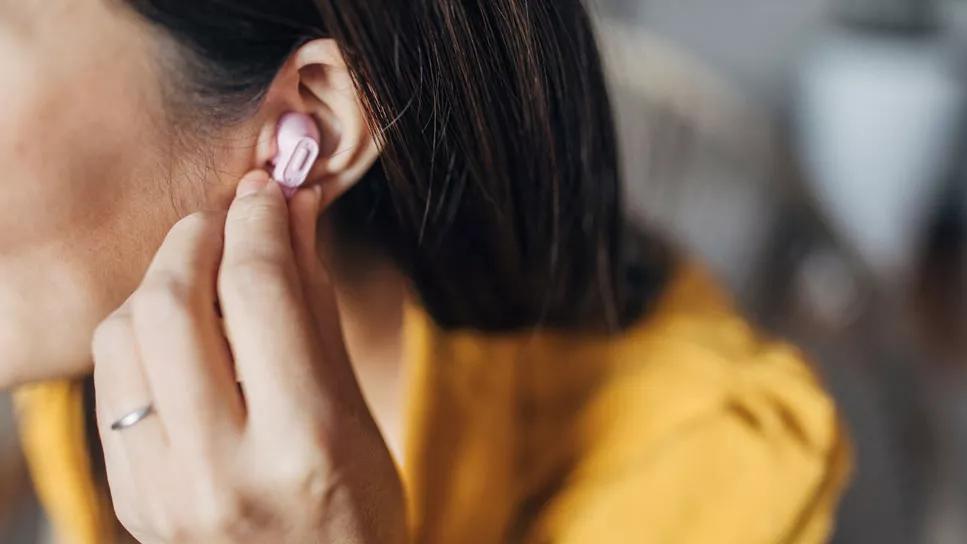Care for your ears by steering clear of cotton swabs, taking precautions in loud settings and seeking medical help when needed

Image content: This image is available to view online.
View image online (https://assets.clevelandclinic.org/transform/3f758308-14ed-4d91-b4c9-86cb68e87692/ear-buds-1987769878)
person adjusting ear bud in ear
Your ears are probably something you don’t give much thought to on a day-by-day basis. That is, until you get an ear infection. Or they start ringing. Or they start itching.
Advertisement
Cleveland Clinic is a non-profit academic medical center. Advertising on our site helps support our mission. We do not endorse non-Cleveland Clinic products or services. Policy
And suddenly, your ears and your hearing jump to the top of your concerns.
“It’s natural to take our hearing and our ear health for granted,” says audiologist Julie Honaker, PhD. “But proactive ear care and hearing loss prevention can make a big difference in your well-being.”
That means cleaning your ears the right way. Using hearing protection properly. Preventing injury to your ears. And getting medical attention when you need it.
Dr. Honaker shares her top tips to properly care for your ears and save your hearing.
Proper ear hygiene is important. But it may not look like what you expect.
For starters: Step. Away. From. The. Cotton. Swab.
Earwax isn’t dirty or unhealthy. In fact, it’s the opposite. Earwax helps ward off fungal infections and bacteria. And it helps keep out tiny particles that can cause damage to your eardrum. That includes things like dust and hair.
“It’s a common misperception to think you should be removing earwax regularly,” Dr. Honaker shares. “But the truth is that earwax is your body’s built-in system for cleaning your ears and a natural moisturizer.”
Dr. Honaker advises cleaning your ears only with a washcloth on your finger. No Q-tips®, bobby pins or sharp pointed objects. Those things can injure your ear canal and eardrum.
Advertisement
As for that ear candling method that claims to draw “impurities” and “toxins” from your ears? Also, steer clear.
Researchers and the U.S. Food and Drug Administration (FDA) warn against the practice of ear candling, as it’s been shown to carry a high risk of burns and middle ear damage. Scientists in one study say, “The inescapable conclusion is that ear candles do more harm than good.”
If you have a build-up of earwax that’s blocking your hearing or creating a muffled sound, see a healthcare provider to have it removed. Don’t try to remove it on your own.
If you have pierced ears, clean your earrings and earlobes regularly with rubbing alcohol.
You know that ear ringing you get after walking out of a concert? It goes away eventually, but the reality is that ringing is a sign of hearing damage. And loud noises take a big toll on your hearing.
“Exposure to loud noises damages your inner ear and can lead to irreversible hearing loss,” Dr. Honaker says. “Even if you think your hearing has returned to normal after a loud event, the noises can still have done damage to the hair cells in your inner ear. And when enough of those hair cells are damaged, you can experience permanent hearing loss.”
So, protecting your hearing from loud sounds is important to maintaining your hearing for the rest of your life. In other words? Turn the volume down. Seriously, risking your hearing isn’t worth it.
Dr. Honaker shares these tips to protect your hearing:
Advertisement
Some activities can put your ears at risk for injury. Minimize your potential by:
Getting prompt attention for changes in your hearing is important to preserving the hearing you have left. But too often, people don’t seek help until they’re experiencing more severe hearing loss.
“When hearing loss comes on gradually, people can easily overlook the signs that their hearing is deteriorating,” Dr. Honaker notes. “But it’s important to see a healthcare provider about hearing loss, as it can really affect your relationships and your satisfaction with your life. It can even put you at higher risk for dementia.”
Signs of hearing loss include:
Advertisement
Again, you may not even notice the beginnings of hearing loss. Others around you might notice it even before you do. If someone in your life suggests that you may be having trouble hearing, take them seriously. They may be on to something.
Your ears and your hearing deserve your attention. After all, your hearing impacts your life and your well-being in big ways.
Some reasons to get medical attention for your ears include:
Don’t hesitate to talk with a healthcare provider, like an audiologist, about ear troubles or hearing loss. They can examine you, advise you and help you get the treatment you need.
Advertisement

Delivered every Tuesday!
Sign up for our Health Essentials emails for expert guidance on nutrition, fitness, sleep, skin care and more
Learn more about our editorial process.
Advertisement
This olive oil-based soap is generally mild and safe when diluted
Research doesn’t show a link between the personal hygiene product and breast cancer
Elastic therapeutic tape can provide extra support, but it can’t improve your stats
There are lots of tips, tricks and assistive devices out there that can help
Despite unhealthy side effects, 40% of adult Americans still pee in pools
Fit, duration and positioning are more important than you might think
This tool is an add-on to your regular brushing and flossing habits, not a replacement for them
Building shoulder strength can minimize your risk of injury
Type 2 diabetes isn’t inevitable with these dietary changes
Applying a hot or cold compress can help with pain
Pump up your iron intake with foods like tuna, tofu and turkey